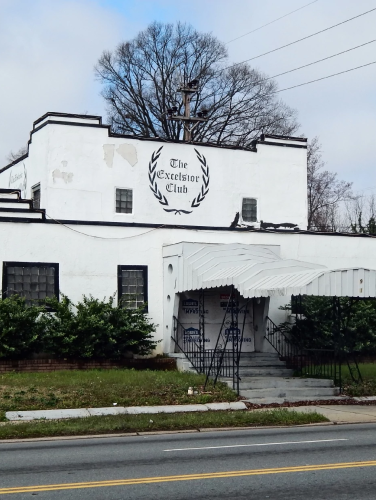
Excelsior Club
(ca. 1910s)
The Excelsior Club was the Southeast’s leading private social club for Black patrons for much of the twentieth century.
921 Beatties Ford Road, Charlotte, NC 28216
For nearly four decades following its 1944 launch, the Excelsior Club was the leading private Black social club in the Southeast and one of the largest clubs of its kind on the East Coast. James "Jimmie" Robert McKee (1913-1985) started the Excelsior in a two-story seven-room early twentieth-century house in Washington Heights that he purchased at public auction in July 1944 for $3,510. The early death of his father forced the fourteen-year-old McKee to drop out of school to go to work to support his six siblings. In addition to working in the mailroom of a local trucking company, McKee moonlighted as a bartender and server at parties and in Charlotte’s private White country clubs. In 1939, he decided the local Black community needed its own private clubs. Aided by several friends who worked in other local private clubs, McKee studied the organization and operations of the city’s various clubs.
Property Quick Links
Two short months after his auction purchase of the Beatties Ford Road house – with the help of his father-in-law Oscar Jackson and three friends – McKee had remodeled the house and incorporated as the Excelsior Club. The name was suggested by his attorney, who advised McKee to "exceed all others" in his endeavors. The club opened in September 1944 with a small bar and seating capacity for 75. From its launch, the Excelsior was an exclusive club, with members rigorously screened once recommended by an existing member. In spite of those requirements, the Excelsior proved very successful. Its initial membership of 25 doubled and then tripled within a few short years. Many of Charlotte-Mecklenburg's Black professionals joined, from doctors and lawyers to educators, ministers, and businessmen. The club also became home for numerous men’s and women’s social and civic clubs, fraternities, and sororities.
The Excelsior Club was perhaps best known for the caliber of talent brought in to entertain its members. The biggest names in Black entertainment from the 1940s through the 1960s graced the Excelsior stage, including Nat "King" Cole, Louis Armstrong, James Brown, and Sam Cooke. On Sunday nights during the 1950s, bands broadcast live from the Excelsior on WGIV, Charlotte's first Black radio station. The club was prominently featured in “The Negro Motorist Green Book,” a twentieth-century travel guide listing businesses that did not discriminate against Black patrons. The Excelsior underwent a major expansion in 1952 to modernize its facilities, adding two new banquet and meeting rooms (expanding the club’s capacity to 300 people) and the distinctive Art Deco exterior design. McKee is credited with designing the new look himself. The lobby featured a massive tropical fish tank perched on a stone base so large that it created structural problems for the entire building over time.
McKee and his wife Minnie realized the club’s popularity could help advance local Black concerns and rally Black voters. The Excelsior quickly became a focal point for political candidates seeking city and county offices. Even Bill Clinton came to the Excelsior in 1992 when campaigning for President. The McKees also used the club to push for more Black candidates in city and state government. A beloved philanthropist, McKee sponsored numerous local causes. In 1948, he brought a golf tournament to Charlotte’s Meadowbrook Golf Course that resulted in the desegregation of that course. Following McKee’s death in 1985, the Excelsior Club changed hands several times. Past owners include WBTV’s first Black news reporter/anchor Ken Koontz and prominent local civil rights attorney James Ferguson. The Excelsior closed in 2016.

